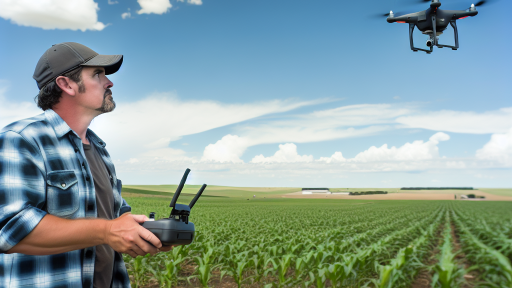Introduction to Agri-Fintech
Definition of Agri-Fintech
Agri-Fintech merges agriculture with financial technology.
This innovative approach enhances the agricultural sector’s efficiency.
It provides farmers with financial solutions tailored to their needs.
Furthermore, it simplifies access to capital for farming operations.
Importance of Agri-Fintech in Modern Farming
Agri-Fintech plays a crucial role in modern farming practices.
It empowers farmers through better financial management tools.
These tools help track expenses and revenues more effectively.
Also, they allow for informed decision-making based on real-time data.
Enhancing Financial Access
Access to finance is a key challenge for many farmers.
Agri-Fintech platforms bridge this gap significantly.
They offer microloans, insurance, and investment opportunities.
Consequently, farmers can invest in essential resources and technologies.
Improving Sustainability
Sustainable farming practices are more accessible with Agri-Fintech.
The technology encourages efficient resource use and waste reduction.
Moreover, it aids in implementing environmentally-friendly practices.
Transform Your Agribusiness
Unlock your farm's potential with expert advice tailored to your needs. Get actionable steps that drive real results.
Get StartedThis shift contributes to long-term agricultural viability.
Driving Innovation
Agri-Fintech fosters innovation in the farming sector.
It promotes the adoption of advanced technologies like IoT and AI.
These technologies improve productivity and accuracy in farming.
In addition, they help farmers adapt to changing market demands.
Enhancing Risk Management
Agri-Fintech tools assist in managing financial risks effectively.
Farmers can analyze market trends and adjust strategies accordingly.
Insurance products specifically designed for agriculture alleviate concerns.
These solutions ensure farmers remain resilient in challenging times.
Current Trends in Agriculture and Technology Integration
Shifts Toward Precision Agriculture
Precision agriculture is transforming traditional farming practices.
This trend utilizes technology to optimize field-level management.
Farmers rely on data analytics and satellite imagery for decision-making.
Consequently, resource use becomes more efficient and sustainable.
Integration of Agri-Fintech Solutions
Agri-fintech is reshaping how farmers access capital.
Innovative financial products can provide more flexibility.
For example, farmers can secure loans based on yield predictions.
This enhances their ability to manage cash flow and invest in improvements.
Utilization of IoT and Smart Farming Technologies
The Internet of Things (IoT) is revolutionizing farm management.
Smart sensors gather real-time data from fields and livestock.
This data enables farmers to make informed decisions quickly.
Moreover, automation reduces the need for manual labor.
Adoption of Sustainable Practices
Sustainable farming practices are increasingly essential.
They help preserve ecosystems while enhancing productivity.
Farmers are adopting regenerative agriculture techniques.
Showcase Your Farming Business
Publish your professional farming services profile on our blog for a one-time fee of $200 and reach a dedicated audience of farmers and agribusiness owners.
Publish Your ProfileThese methods promote soil health and reduce chemical reliance.
Growing Demand for Organic Products
Consumer preference for organic produce continues to rise.
This shift encourages farmers to change their growing practices.
As a result, they focus on natural methods and certifications.
Thus, farmers can tap into new markets and higher price points.
Benefits of Agri-Fintech Solutions for Farmers
Access to Capital
Access to capital is vital for farmers’ growth.
Agri-fintech solutions streamline loan applications.
They provide farmers with quicker funding options.
This increased financial accessibility empowers farmers.
Moreover, innovative funding platforms reduce interest rates.
Farmers can invest in advanced equipment and technology.
Market Insights
Agri-fintech solutions offer data-driven market insights.
Farmers can analyze pricing trends effectively.
This access helps them make informed selling decisions.
Furthermore, customized analytics improve farm productivity.
Farmers can track consumer preferences reliably.
Enhanced market knowledge leads to better crop planning.
Improved Financial Management
Agri-fintech tools enhance financial management.
Farmers can track income and expenses easily.
These solutions promote better budgeting strategies.
Farmers learn to identify unnecessary costs.
Ultimately, improved management leads to higher profits.
Collaboration Opportunities
Agri-fintech platforms foster collaboration among farmers.
They connect farmers with suppliers and buyers.
This network enhances bargaining power significantly.
Additionally, collaboration leads to shared knowledge.
Farmers also access collective investment opportunities.
Such resources improve resilience in the industry.
Explore Further: Using Blockchain For Enhanced Record Keeping In Agricultural Operations
Case Studies of Successful Agri-Fintech Implementations Worldwide
Transforming Agriculture in India
In India, the startup AgroStar revolutionized farming practices for smallholder farmers.
The company provides access to quality agricultural inputs through a mobile platform.
Farmers utilize the app to order seeds, fertilizers, and pesticides directly.
This seamless process reduces unnecessary middlemen costs.
Moreover, AgroStar offers advisory services tailored to specific crops.
Farmers reported increased yields and improved profits from using the platform.
Innovations in Africa
In Africa, Twiga Foods is changing the supply chain dynamics.
This company connects farmers with urban retailers through a digital marketplace.
Twiga manages logistics, ensuring timely delivery of fresh produce.
This system reduces food wastage and enhances market access for farmers.
As a result, farmers see better prices for their produce.
Showcase Your Farming Business
Publish your professional farming services profile on our blog for a one-time fee of $200 and reach a dedicated audience of farmers and agribusiness owners.
Publish Your ProfileThe initiative has contributed to food security in several regions.
Agri-Fintech in Latin America
In Brazil, Agronegócio benefits from integrated financial solutions.
This platform offers loans tailored specifically for agricultural needs.
Farmers can access financing for machinery, seeds, and equipment.
The platform’s risk assessment tool ensures fair lending practices.
Consequently, farmers are more confident in expanding their operations.
This financial inclusion fosters sustainable agricultural growth.
Digital Solutions in Southeast Asia
Indonesia’s TaniHub has successfully created an online marketplace for farmers.
The platform connects directly with consumers, enhancing profitability.
TaniHub uses blockchain technology to ensure transparency in transactions.
Farmers can receive immediate payments, improving cash flow.
This ensures farmers have funds for future planting seasons.
Thus, it promotes a more stable agricultural landscape.
Leveraging Technology in North America
American company Farmer’s Business Network utilizes data analytics for farmers.
It provides insights on pricing, inventory, and market trends.
Farmers can make informed decisions that enhance profitability.
This network fosters collaboration among farmers in the region.
Consequently, farmers share best practices and resources seamlessly.
This collaborative spirit enhances overall agricultural productivity.
Explore Further: Integrated Pest Management Strategies with Modern Technology
Challenges Facing the Adoption of Agri-Fintech
Infrastructure Needs
Agri-fintech relies heavily on strong infrastructure.
Many farmers face inadequate internet access.
This limitation reduces their ability to adopt new technologies.
Also, financial institutions require robust systems.
These systems must integrate with agricultural practices smoothly.
Moreover, rural areas often lack essential services.
Transportation issues further complicate access to markets.
Consequently, these barriers hinder the adoption of agri-fintech solutions.
Education and Training Gaps
Education plays a crucial role in technology adoption.
Farmers often lack training in digital finance tools.
This gap reduces their confidence in using agri-fintech.
Moreover, existing training programs may not be sufficient.
It’s essential to develop specialized training initiatives.
Stakeholders must work together for effective education delivery.
Additionally, younger farmers may require mentorship.
They have the potential to become early adopters.
By investing in education, we can empower the next generation.
Ultimately, this will enhance long-term success in farming.
Addressing Cultural Resistance
Cultural factors also impact agri-fintech adoption.
Some farmers prefer traditional methods over digital solutions.
Showcase Your Farming Business
Publish your professional farming services profile on our blog for a one-time fee of $200 and reach a dedicated audience of farmers and agribusiness owners.
Publish Your ProfileThis resistance can stem from a lack of trust in technology.
Moreover, some believe existing practices are sufficient.
To overcome this, demonstrating the benefits is crucial.
Success stories can inspire others to adopt new practices.
Community engagement will help build trust over time.
Thus, addressing cultural attitudes is vital for progress.
Gain More Insights: Enhancing Farm Efficiency Using AI
Future Technologies in Agri-Fintech: AI, Blockchain, and IoT Innovations
Artificial Intelligence in Agriculture
Artificial intelligence (AI) transforms the agricultural landscape.
Farmers can use AI for precise data analysis.
AI-driven tools enhance crop yield predictions.
Additionally, AI optimizes resource management.
Real-time monitoring assists with pest detection.
This technology supports better decision-making.
Blockchain for Transparency
Blockchain technology promotes supply chain transparency.
It creates verifiable records of each transaction.
Farmers benefit from increased traceability of products.
Consumers gain confidence in the origins of their food.
Moreover, blockchain minimizes fraud in agricultural trade.
Smart contracts streamline transactions, reducing costs.
The Internet of Things in Farming
The Internet of Things (IoT) links various farming devices.
Sensors collect and transmit data on soil health.
This connectivity empowers farmers with real-time insights.
Automated irrigation systems improve water efficiency.
IoT devices also help monitor livestock health.
As a result, farmers can respond swiftly to challenges.
Integrating Technologies for Comprehensive Solutions
Combining AI, blockchain, and IoT delivers holistic benefits.
These technologies work together to streamline operations.
They create an integrated agricultural ecosystem.
Farmers can harness big data for better analytics.
Ultimately, this integration leads to sustainable practices.
Long-term success hinges on embracing these innovations.
Learn More: How Automated Machinery Reduces Labor In Agriculture

Strategies for Farmers to Embrace Agri-Fintech for Sustainable Growth
Understanding Agri-Fintech
Agri-Fintech combines agriculture with financial technology.
This integration enhances financial services for farmers.
Farmers can access better loans and investment options.
Additionally, Agri-Fintech tools improve farm management.
Leveraging Data Analytics
Data analytics offers insights into farm operations.
Farmers can use data to optimize yields and reduce costs.
Moreover, analytics provide market trends and consumer preferences.
This knowledge helps farmers make informed decisions.
Showcase Your Farming Business
Publish your professional farming services profile on our blog for a one-time fee of $200 and reach a dedicated audience of farmers and agribusiness owners.
Publish Your ProfileAdopting Mobile Platforms
Mobile technology facilitates easier access to financial services.
Farmers can manage accounts and transactions on-the-go.
Furthermore, mobile platforms offer education and resources.
These tools empower farmers with vital information.
Building Collaborative Networks
Collaboration among farmers fosters innovation and resource sharing.
Agri-Fintech platforms allow users to connect and learn together.
For instance, collective purchasing can reduce costs.
Sharing best practices enhances productivity across the board.
Engaging with Financial Institutions
Establishing relationships with financial institutions is crucial.
Farmers should seek partnerships that support technological advancements.
Access to tailored financial products can be a game-changer.
Networking with banks allows for understanding specific needs.
Training and Skill Development
Continuous training ensures farmers remain competitive.
Workshops on technology usage enhance skill sets.
Moreover, understanding financial literacy is essential.
Farmers must know how to effectively manage their finances.
Prioritizing Sustainability
Integrating Agri-Fintech promotes sustainable farming practices.
Sustainability attracts investment and supports community well-being.
Farmers can track environmental impacts using tech tools.
Embracing sustainability enhances long-term viability.
Staying Informed on Regulations
Farmers should stay updated on Agri-Fintech regulations.
Understanding compliance helps in mitigating risks.
Moreover, regulations can influence financial opportunities.
Participation in industry forums can aid knowledge sharing.
Role of Government and Policy in Supporting Agri-Fintech Initiatives
Government Funding and Support Programs
Government funding plays a crucial role in promoting agri-fintech innovations.
These initiatives help farmers access new technologies more easily.
Support programs often include grants and low-interest loans for startups.
For example, the Agriculture Innovation Act provides resources to agri-tech firms.
Such funding enables farmers to adopt digital solutions swiftly.
Regulatory Framework and Compliance
A clear regulatory framework is essential for the growth of agri-fintech.
Governments must establish guidelines that encourage innovation while ensuring safety.
This framework aids in building trust among farmers and investors alike.
Championing transparency in financial transactions is also vital.
Additionally, simplifying compliance processes can lower barriers for new companies.
Collaborations and Partnerships
Collaboration between government and the private sector fosters innovation.
Public-private partnerships can lead to focused research and development.
For instance, the USDA collaborates with fintech companies to enhance financial access.
Such partnerships can create tailored solutions for farmers’ specific needs.
These collaborations leverage combined expertise for greater impact.
Education and Training Programs
Investing in education can empower farmers to leverage agri-fintech tools.
Showcase Your Farming Business
Publish your professional farming services profile on our blog for a one-time fee of $200 and reach a dedicated audience of farmers and agribusiness owners.
Publish Your ProfileTraining programs help farmers understand digital finance and technology.
Workshops and online courses can provide necessary skills for success.
Educational initiatives can be supported by the government and NGOs.
Ultimately, an informed farmer is more likely to embrace new technologies.
The Path Forward for Farmers in the Age of Agri-Fintech
Adapting to New Technologies
Farmers must embrace technological advancements in agri-fintech.
These technologies provide innovative solutions for financial management.
Moreover, they enhance decision-making through data insights.
Building Sustainable Financial Practices
It is crucial for farmers to establish sustainable financial practices.
This includes effective budgeting and cash flow management.
Farmers should utilize financial tools designed for agriculture.
Leveraging Data for Future Growth
Data analytics will play a vital role in farming’s future.
By interpreting data, farmers can optimize crop yields effectively.
Additionally, they can make informed decisions on resource allocation.
Enhancing Access to Financial Resources
Access to capital is essential for farmers’ growth.
Agri-fintech platforms can facilitate easier loans and investments.
These platforms help streamline funding processes significantly.
Collaborating with Fintech Innovators
Farmers should seek partnerships with fintech companies.
These collaborators bring fresh perspectives on financial solutions.
Such partnerships can also drive technological innovations in farming.
Investing in Education and Training
Education and training are crucial for successful adaptation.
Farmers need to understand how to use new agri-fintech tools.
Continuous learning will ensure sustainable growth and competitiveness.
Future-Proofing Agricultural Operations
Farmers must prepare for future challenges in agriculture.
This involves integrating resilient practices into their operations.
Ultimately, the goal is to build a robust agricultural sector.
Additional Resources
AI in Agriculture — The Future of Farming
FUTURE FOODSCAPES Re-imagining Agriculture in Latin America …




